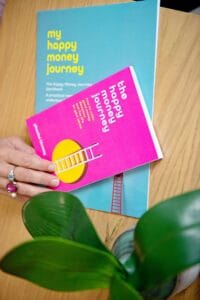As the clock strikes midnight on 31st December, many of us have a list of things that we want to change, do or achieve in the new year.
Getting better with money is high on the list but it fills many of us with dread and fear. Getting financially fit can be life changing but means changing habits. Our habits are what keep us where we are or change us. Habits end up playing a huge role in our everyday lives.
As parents, our habits and routines are constantly being moved, and interrupted by the needs and wants of our family. Of course, we are going to prioritise family, but we also need to remember that unless we are taking care of ourselves – we are useless to others. Investing in your own mental, physical, and financial ‘fitness’ will reap rewards not just for you, but your family too – with a happy, healthier and more financially savvy parent and partner.
It is possible to learn how to change our ways, and little by little – we will get the results we want – a healthier relationship with money and healthier bank account.
This is where we need to start.
Mindset
Start with your mindset… sometimes we must trick our mind into changing. This can be the smallest step with the best results. Language is important. Start by simply listening to yourself when you talk about money. What do you say? Is your language letting money control you rather than the other way around? This can be difficult particularly when you may not actually feel in control of any of your money because we have chosen to stay home, or you are deep in debt, or you are out of work.
Some quick tricks to change your mind:
- What is one thing that makes you feel wealthy? Fresh cut flowers? Clean house? Fancy dinner? Dressing up to do something? A glass of wine with your friends at a local bar? Find that one thing and do it!
- Listen to your talk and self-talk. Correct yourself when you hear a negative comment.Life can get hard when money is short and it’s easy to shame spiral and be mean to yourself. Even if the best you can do is say “this too shall pass”, say it to yourself.
Talk About Money
The biggest money mistake I ever made was not talking to my boyfriend about money. If I had done this, I would have noticed a whole lot of red flags a lot sooner. We all make mistakes at some time; however, I did learn that fights about money are not really about money, they are about the disconnect in goals, dreams and values. They are a sign, we; as our part of a couple are off track and out of sync. One of the very best pieces of advice the Barefoot Investor, Scott Pape, has is to have a financial date night.
You want to be moving in the same direction and be able to make choices TOGETHER. When one person in a couple is overspending and the other is massively saving, it’s time to have that date night. Be gentle in your approach rather than evangelical. Leave blame and shame well out of it – saying “It’s your fault we never have any money you spend too much” is a useless, pointless and directionless argument.
Create Habits
It’s time to create some positive money habits. They don’t have to be monumental. Just little tweaks can make a huge difference. Suggestions could include:
- Bring snacks with you when you go out rather than buying
- Automate bill payments from a single account
- Organise your spending so you can always cover bills
- Create a savings habit
What do you do with your savings? Gone are the days of the spare change pot that adds up over time. With less and less people using cash it becomes harder to make these incidental savings with a ‘slush fund’.
This is where micro investment apps are a good solution. These apps allow you to save small sums of money that you can’t access easily. Better still, it accumulates without you noticing. The app rounds up your spending and pays your change into investments. You choose how high risk you would like that investment to be (I chose high just to see and then changed to ethical which also did well).
For example, when you spend $8.50 on a sandwich and coffee deal, this is rounded up to $9.00 and 50 cents is moved to your micro investing app. If you link multiple accounts this can add up quickly, and along the way you can see your investments grow. Some of them even offer accounts for kids which is great for parents and grandparents.
This method is called invisible savings and it can give your mindset a bit of a boost too; seeing the balance climb, dividends paid and capital growth of your investment all on the app.
Know Where Your Money Goes
It’s time to take a deep dive into your spending. This is the money equivalent of a food diary. Start by downloading all your statements into an Excel document. Go through each statement and look at where your money goes. There are apps that can also do this for you. Whatever method you choose to use, don’t guess as you will undoubtedly get it wrong.
Generally, when people do this the biggest spending regret, they have is normally the drive thrus, takeaways meals and coffees that pile up over time to end up as thousands of dollars every year. Frightening stuff! These deep dives are a game changer when it comes to financial fitness. It means you know exactly where you are spending and can help you become more money savvy.
Understand Your Investments
Like it or not you are already an investor so you need to understand your current investments and what they are. Look at your super, use the new Government app to review it www.yoursuper.gov.au and you see how your fund performs.
Understand the rules around Super. How much you can add, what happens to your balance when you are on parental leave and payments stop, or the balance gets low? Also know where your money is invested, does it match your values? Most funds now have a greater degree of choice in how you, as a member, want to invest. This is one of your biggest investments.
Another is your home. Understand its worth, the growth of property in your area, how much equity you have (that is the difference between what you owe and what your house is worth). How much are your repayments, what is your rate, when will it be paid off? This all helps you on your way.
Understanding your money, being curious and taking a little bit of time to get and to stay in control is how you will get financially fit in 2022. What are you waiting for? It’s time to make friends with money in 2022.

Phoebe Blamey is the author of the Happy Money Journey – a guide to helping women become unshakeable with their money! It is a friendly, fearless personal advice to help make good money decisions and live life on your own terms.





